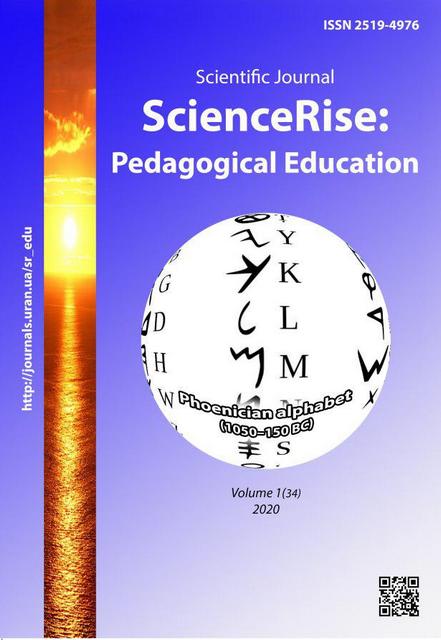Educational stage of the formation of the youth social activity system in civil society institutes
DOI:
https://doi.org/10.15587/2519-4984.2020.192689Keywords:
social activity, youth, institute of civil society, project, education, stage, systemAbstract
The article describes the content of the educational stage of the system of formation of social activity of youth in civil society institutions. This stage involved the formation of basic ideas of young people about the structure, content, directions, projects of civil society institutions; mastering of knowledge and acquisition of planning skills, organization of activity of civil society institutions; systematization of knowledge about the role of youth in the development of civil society, models of youth participation in public life. Among the main projects and invents, implemented within this stage, the following are presented in the article: regional stages of the International Program “Student Republic” on “Positive scenarios for the modernization of the Donetsk region: the role of communities and youth” and “Education – a key focus of the new industrialization of the Donetsk region” (students discussed important issues in the region and worked out their own solutions); regional event “The best students of Donetsk region” (students with academic, social, social and sporting degrees in higher education institutions are recognized); project “Civic Education of Youth in Ukraine” (conducting a series of educational events for young people on the means of realization of civic youth activity, skills of project activity, interaction with the authorities during public activity, the participants of which had the opportunity to participate in the competition of projects for receiving mini-grants); project “Workshop for Active Youth: East and West Together” (thematic trainings, workshops on topical issues: e-governance, decentralization, youth participation in decision-making processes, opportunities for youth, project management etc.). The study also presents a series of trainings and debates, conducted with the youth of eastern Ukraine to formation their social activity
References
- Stupak, O. Iu. (2019). Kontseptualni osnovy formuvannia sotsialnoi aktyvnosti molodi v instytutakh hromadianskoho suspilstva. Humanizatsiia navchalno-vykhovnoho protsesu, 5 (97), 56–68.
- Karaman, O. (2012). Systemnyi pidkhid yak metodolohiia doslidzhennia sotsialno-pedahohichnoi roboty z nepovnolitnimy zasudzhenymy v Ukraini. Naukovi zapysky Kirovohradskoho derzhavnoho pedahohichnoho universytetu imeni Volodymyra Vynnychenka. Seriia Pedahohichni nauky, 107 (1), 222–229.
- Stupak, O. Iu. (2019). Features of social activity of youth in civil society institutions. Profesionalizm pedahoha: teoretychni y metodychni aspekty, 10, 223–234.
- Kharchenko, S. Ya. (Ed.) (2016). Systemnyi pidkhid u suchasnykh pedahohichnykh doslidzhenniakh v Ukraini. Starobilsk: LNU imeni Tarasa Shevchenka, 495.
- Ryzhanova, A. O. (2019). Methodological Issues of Social Pedagogy Under Conditions of Information Society. Bulletin of Luhansk Taras Shevchenko National University, 1 (1 (324)), 75–82. doi: http://doi.org/10.12958/2227-2844-2019-1(324)-1-75-82
- Borodin, Ye., Tarasenko, T. (2015). The development of local government in Ukraine. Aspekty publichnoho upravlinnia, 4 (18), 55–61.
- EU/Council of Europe. Declaration of the 1st European Youth Work Convention (2010). Ghent, 6. Available at: https://pjp-eu.coe.int/documents/42128013/47262202/Declaration/2f264232-7324-41e4-8bb6-404c75ee5b62 Last accessed: 27.06.2019
- Ord, J. et. al. (2018). The Impact of Youth Work in Europe: A Study of Five European Countries. Helsinki, 243.
- Lauritzen, P.; Lauritzen, P. (Ed.) (2008). Defining Youth Work: Eggs in a Pan. In Speeches, Writings and Reflections. Council of Europe Publishing, 120.
- Ungar, M., Liebenberg, L., Landry, N., Ikeda, J. (2012). Caregivers, Young People with Complex Needs, and Multiple Service Providers: A Study of Triangulated Relationships. Family Process, 51 (2), 193–206. doi: http://doi.org/10.1111/j.1545-5300.2012.01395.x
- Almqvist, A.-L., Lassinantti, K. (2017). Social Work Practices for Young People with Complex Needs: An Integrative Review. Child and Adolescent Social Work Journal, 35 (3), 207–219. doi: http://doi.org/10.1007/s10560-017-0522-4
- Stupak, O. Iu. (2019). Methodological approaches to the process of forming social activeness of youth in civil society institutes. Zbirnyk naukovykh prats Umanskoho derzhavnoho pedahohichnoho universytetu, 2, 127–138.
Downloads
Published
How to Cite
Issue
Section
License
Copyright (c) 2020 Oksana Stupak

This work is licensed under a Creative Commons Attribution 4.0 International License.
Our journal abides by the Creative Commons CC BY copyright rights and permissions for open access journals.
Authors, who are published in this journal, agree to the following conditions:
1. The authors reserve the right to authorship of the work and pass the first publication right of this work to the journal under the terms of a Creative Commons CC BY, which allows others to freely distribute the published research with the obligatory reference to the authors of the original work and the first publication of the work in this journal.
2. The authors have the right to conclude separate supplement agreements that relate to non-exclusive work distribution in the form in which it has been published by the journal (for example, to upload the work to the online storage of the journal or publish it as part of a monograph), provided that the reference to the first publication of the work in this journal is included.








